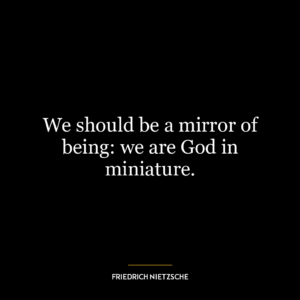The quote “Precisely this is godliness–that there are gods, but no God” can be understood as an exploration of the concept of divinity from a non-traditional perspective. It suggests that the divine or the sacred is not confined to a singular, all-powerful entity (God), but can be found in multiple forms (gods). This idea challenges monotheistic views and proposes a more pluralistic understanding of divinity, emphasizing the multiplicity of divine aspects rather than a singular, monolithic deity.
This perspective can be seen as a call for the acceptance and celebration of diversity, not just in the realm of spirituality, but also in our approach to life and human relations. It encourages us to acknowledge and appreciate the various forms of beauty, wisdom, and strength that exist around us, instead of seeking them in a single, idealized entity. It also promotes the idea that divinity or godliness can be found within ourselves and in our interactions with others, rather than in an external, distant deity.
In today’s world, this idea can be applied in various ways. In the socio-cultural context, it can be seen as a plea for pluralism and inclusivity, urging us to respect and value different cultures, beliefs, and lifestyles. It can also be applied in the realm of personal development, encouraging us to recognize and cultivate our unique strengths and qualities, instead of trying to conform to a single, standardized ideal. It suggests that each of us has the potential to be divine or god-like in our own unique way, and that our individuality is a manifestation of the divine.







